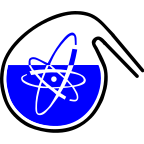Speakers
Description
The importance of the uranium speciation study, specifically in the alkaline environment of cement-based materials, stems from the conditions that can be expected in low and intermediate level waste repositories and also deep geological repositories for spent nuclear fuel, in their section for the storage of high-level decommissioning waste. In addition to its common construction function, cementitious material is used as an engineering barrier, the purpose of which is to slow down transport processes as much as possible, and thus prevent radionuclides from escaping from the repository. Cement is ordinarily utilized as a filler of barrels and a backfill in low and intermediate level waste repositories and will also serve as a barrier in concrete containers when depositing highly active waste during decommissioning. For reliable modelling of processes taking place within this barrier, it is necessary to know the present species of radionuclides. Time resolved laser induced fluorescence spectroscopy (TRLFS) was used to study the uranium speciation in the pH range 6-12 at room temperature. The measured spectral characteristics were mathematically processed. Based on spectra and time characteristics (lifetimes) depending on the pH, specific species were assigned to individual samples by comparison with speciation diagrams modelled using the database Termochimie.

